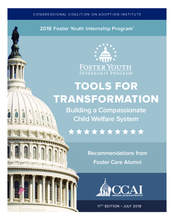Displaying 181 - 190 of 377
CCAI’s Foster Youth Internship Program® is a highly esteemed congressional internship for young adults who spent their formative years in the U.S. foster care system. In this annual policy report, the interns focus on subjects they are personally passionate about due to their experiences and understanding after living in foster care and make personal recommendations for improving the U.S. foster care system.
This is a pilot study on the sensitive issue of how children and young people experience family contact in foster care, and the views of key adults in their lives on the same issue.
Developed with Columbia University and experts from the Lancet Commission on Adolescent Health and Wellbeing this series of briefs from UNICEF Innocenti provides a much needed review of contemporary research methodologies for adolescent well-being in low- and middle-income countries.
In this study, the participation of children in the Dutch child protection system (CPS) under the new Youth Act 2015 is critically analyzed.
This paper presents the results from a Youth Lead Project on the voices and participation of children in state care in Ontario Canada.
The quantitative study presented here contributes knowledge regarding the attitude of professionals towards positive parenting and child participation in professional support of families that are under temporary protection, with the goal of reunification.
This quantitative study contributes knowledge regarding the attitude of professionals towards positive parenting and child participation.
In this study, the participation of children in the Dutch child protection system (CPS) under the new Youth Act 2015 is critically analyzed.
On the basis of qualitative interviews with 10 children about their experiences collaborating with child welfare professionals, this study has identified ways in which professionals can facilitate children's participation.
In this webinar, hosted by Rise Learning Network, Deep Savarni, Founder & Director of Praajak Development Society shares his experience in establishing the Child Protection Committees as a means to realize effective participation of children in monitoring care services in government-run child care institutions in India.

